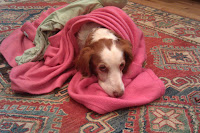 |
| A very willing playmate |
Since my first dog in the early '90s I've read and re-read a number of books and managed to pull a few nuggets from most of them. The one point they fail to emphasize, however, is how important patience is in bringing a dog along. They do a fine job of explaining what to do and what not to do, but they don't spend much time talking about how to go about it - patiently. You'll read things like "don't rush through this step" and "the dog will tell you when it's time to proceed", but this fundamental aspect doesn't receive anywhere near the attention that it should. Most inexperienced dog owners assume that the dog is telling them it's time to proceed at roughly the same time they (the owners) are ready to proceed. What a coincidence.
Possibly the authors of dog training books don't spend more time on the subject because it's something you can't exactly learn from a book. I'll go along with this premise. You learn it through experience, and you only get experience by getting older. Still, if more authors devoted a chapter or so to the role of patience in the training process it would at least be in the back of the mind of any new dog owner.
When I think back to training my first bird dog I cringe at the mistakes I made. Most of these were due to a lack of patience layered on top of a lack of knowledge. I read too many accounts of dogs that were finished by the time they were a year old (or even sooner) and by damn I was determined to have one of those. Fortunately for me I had a very forgiving, patient dog. I could have done many things better by simply not being in a hurry. Slow down to speed up as the road course racers say.
Since Wyatt came to live with us in 2010 I've been thinking a lot about patience and its role in the process. It hit home again the other day when I read this post on the Steady with Style website in which Martha Greenlee does an excellent job of showing that time is as critical as any other ingredient in having a bird dog who makes you happy. Martha is one of a handful of trainers who write regularly about the importance of not turning the training process into a contest to see how quickly you can finish.
If you spend time with a good professional trainer you'll notice how critical patience is to the process. Work a dog on two or three birds per session, limit sessions to three or four a week, maybe every other day. Don't try to fix every problem before the end of each session. Think about it - you didn't learn algebra in a day, did you? Some kids catch on quickly, some kids more slowly, but just about all of them get it if the teacher takes the time to keep working with them until the light comes on. If you're struggling with your dog's progress, chances are you're in too much of a hurry.
I'm not a professional trainer and have no illusions of ever becoming one. I just want to keep owning and hunting bird dogs, hopefully good, well-adjusted ones. I'm a better dog owner and handler now than I was and a big part of that is learning the role of patience in the process. It's not a sprint. On average you'll own and hunt a dog for a decade or more. Take a little more time in the beginning to get it right.

Excellent post! How often I wish there'd been someone at my elbow saying, "Quit now -- no hurries." And how lucky I've been to have dogs that were patient with me...
ReplyDelete"Fast is slow, and slow is fast." That is the advice we got from a trainer who specializes in hard case behavioral rehab. I think it surprised even him how right he was.
ReplyDeleteAnd Maddy has not bitten me (very much) since.
Rob and Luisa, thanks for dropping in. I think anyone who's been doing the dog thing a while has had these moments where the importance of moving slowly has taken center stage.
ReplyDelete